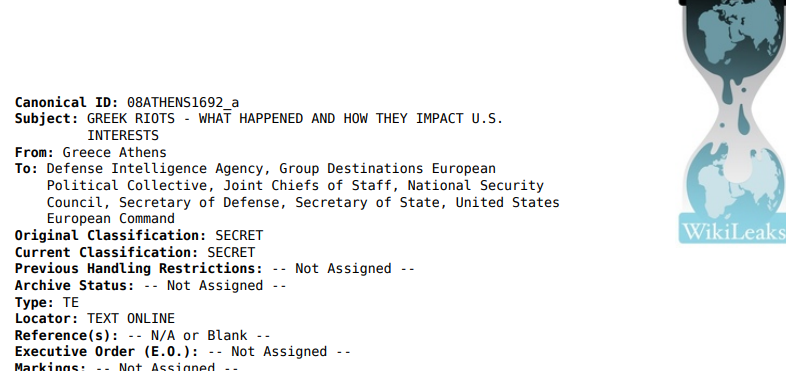

Σταχυολογούμε:
2006, σσ. 13-16:
Πρόβλημα οι φοιτητικές και λαϊκές αντιδράσεις για το ενδεχόμενο ιδιωτικών πανεπιστημίων [opposing GoG plans to reform the Greek university system — especially allowing private, non-profit universities to operate], τα οποία είναι «αγωνιωδώς απαραίτητα» [such reforms are desperately needed], πλήρης ανάλυση, σσ. 13-16.
2008, σσ. 1-7:
*Τη διάγνωση του «προβλήματος» των «Δεινοσαύρων της Σκληρής Αριστεράς» (Dinosaurs of the Hard Left)
*Την επισήμανση του «προβλήματος» του ασύλου [University “asylum” policies prohibit state security forces from entering campuses without permission from university administrators]
*Τη διαπίστωση ότι ο Δεκέμβριος του 2008 θα «καταστήσει δυσκολότερο το να προωθήσουμε την ατζέντα μας [μεταξύ άλλων σε] εκπαιδευτικά ζητήματα» [making it harder to address other issues on our agenda, such as commercial, educational, security, and human rights issues].
2009, σσ. 8-12:
*Πανεπιστημιακό Άσυλο στην Ελλάδα: Ένα πρόβλημα για τη Δημοκρατία [UNIVERSITY ASYLUM IN GREECE: WHEN DEMOCRACY GOES AWRY], ακολουθεί εκτενής ανάλυση για την ανάγκη κατάργησης του πανεπιστημιακού ασύλου από πλευράς αμερικανικής πρεσβείας, π.χ. για το «τρομακτικό κοινωνικό και οικονομικό κόστος του ασύλου» [The Social and Financial Costs are Staggering].
*Εμμέσως επισημαίνεται η ανάγκη να συστρατευθεί η φιλήσυχη φοιτητική πλειοψηφία στην καμπάνια για την κατάργηση του ασύλου [Although Greece’s overwhelming majority of law-abiding, well-meaning students are those most directly affected by the violence on campus, for the most part they remain quietly resigned.]
2009 (β), σσ.17-19:
*Οι «μεταρρυθμιστές της παιδείας» ζητούν αμερικανική βοήθεια [Greek Education Reform Expert Wants U.S. Help]. Ο Γ. Μπαμπινιώτης ήταν «ενθουσιώδης» [Babiniotis shared GoG plans and timelines, and enthusiastically welcomed U.S. assistance].
*Το πρόβλημα: η πολιτικοποίηση των φοιτητών και το άσυλο [University Problems: Politicization of Students and Abuse of Asylum].
*Πρεσβεία: ο Γ. Μπαμπινιώτης μας άνοιξε την πόρτα για την πανεπιστημιακή μεταρρύθμιση [Babiniotis is a knowledgeable, respected academic who knows the Greek educational system well and appears to have support from both New Democracy and PASOK. Our meeting with him, and his enthusiastic acceptance of our offer of U.S. help on university entrance testing, has opened the door to U.S. input and expertise on one of the most important reforms in recent Greek history. In the coming months, Post will consult with the Department on best ways to provide U.S. advice and assistance.]
2009 (γ), σσ. 20-26:
*Τα προβλήματα της ελληνικής εκπαίδευσης, μια ευκαιρία για τη διπλωματία των ΗΠΑ [THE SORRY STATE OF THE GREEK EDUCATIONAL SYSTEM: A CHALLENGE FOR U.S. PUBLIC DIPLOMACY]
*Το βασικό πρόβλημα: οι φοιτητές έχουν ισχύ και πολιτική άποψη [where the rights of students to demonstrate and disrupt classes trump the rights of all to a quality education. Politically-affiliated student groups wield increasing power.]
*Και ξανά: το πρόβλημα είναι οι φοιτητές και το άσυλο [Greek Universities: Powerful Student Unions and Asylum], καθώς και η κληρονομιά του Πολυτεχνείου του 1973 [The 1973 Polytechnic uprising, in which a number of students were crushed by junta tanks on the Polytechnic grounds, gave birth to the concept of university “asylum” still in effect and used as political capital today.]
*Πρόβλημα: τα στελέχη της Πρεσβείας των ΗΠΑ δεν είναι ευπρόσδεκτα από τους φοιτητές στα ελληνικά πανεπιστήμια [No Welcome Mat for the Embassy. Anti-Americanism is still quite high in Greek universities, and student demonstrations often lead past the Embassy. The highly-politicized and often leftist nature of many universities in Greece makes it dangerous for Embassy staff to visit campuses and impossible for the Embassy to be identified in joint programs.]
Και βέβαια…
*…Μήπως η Ιδιωτικοποίηση της Παιδείας είναι η απάντηση; [Is Private Education the Answer to a Failing System?]»

Δεν υπάρχουν σχόλια:
Δημοσίευση σχολίου